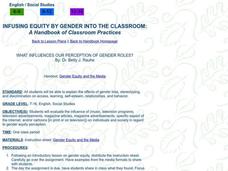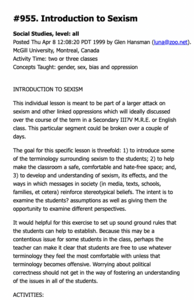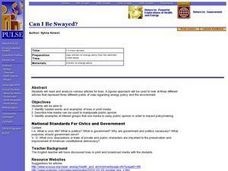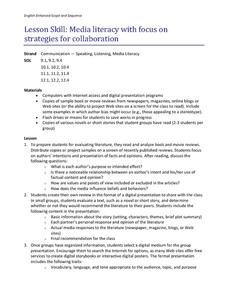Beyond Benign
The Story of Cosmetics Video Assessment
Does your shampoo contain carcinogens? Scholars learn how cosmetic companies create and market their products, many of which contain toxic chemicals. They examine the bias and consumer responsibilities in the industry.
iCivics
Lesson 2: Misinformation
Fake news is a hot topic right now ... but what is it? Intrepid young investigators track down the facts that separate journalistic mistakes and misinformation through reading, research, and discussion. Part three in a five-lesson series...
Media Smarts
TV Dads: Immature and Irresponsible?
Examine gender stereotypes on television, focusing on fathers portrayed in sitcoms and advertising. Questions on a handout direct learners to consider the types of fathers they see on television and one advertisement is highlighted as...
K20 LEARN
The Bank Of Justice: Civil Rights In The US
To launch a study of racial segregation and integration, young historians first watch a news video about a prom in Georgia that was first integrated in 2013. They then compare the goals in Lincoln's Gettysburg Address to King's "I Have a...
Academy of American Poets
Teach This Poem: “Making History” by Marilyn Nelson
What makes an event newsworthy, worth a reference in a news magazine or textbook? Who decides? These are questions Marilyn Nelson asks readers of her poem "Making History" to consider. To begin, class members list details they notice in...
Curated OER
World Media: Comparison of Iraq War Accounts
Students are introduced to the concept of news/media bias from region to region. Upon reading differing articles, students answer source questions on the structure/content of each article.
Curated OER
A Media Literacy Unit on "Turn Beauty Inside Out"
Students become aware of the importance of distinguishing between inner and outer beauty. They explore how the media's opinion of beauty is biased and should be evaluated rather than just accepted. Each student also assesses how the...
Curated OER
WHAT INFLUENCES OUR PERCEPTION OF GENDER ROLES?
Students talk about the influence of media on gender equity perception.
National First Ladies' Library
Michigan vs. Ohio State: A Serious Rivalry!
Middle schoolers discuss and research the pros and cons of school rivalries. In particular, they study the Michigan-Ohio State rivalry. Through their research, they think about how media accounts of college football games can be shaped...
Willow Tree
Data Sampling
Some say that you can make statistics say whatever you want. It is important for learners to recognize these biases. Pupils learn about sample bias and the different types of samples.
National Center for Case Study Teaching in Science
Cell Phone Use and Cancer
The cell phone you're using is making you deaf: news at 11:00. Oftentimes, the media uses fear tactics and other techniques to increase its audience base. In an intriguing look at the difference between scientific journals and...
iCivics
Mini-Lesson: The Incumbent Advantage
Does the person running for re-election have an advantage over the challenger? Scholars explore the concept of incumbent advantage during elections using an informative mini-instructional activity explaining the legislative branch. In...
iCivics
Mini-Lesson: Executive Orders
Can the President of the United States pass a law all by himself? Scholars investigate the concept of the executive order in regards to the powers of the presidency. They use current issues and events to monitor media bias while also...
Curated OER
That Is Not My Opinion!
Being an informed citizen requires distinguishing fact from opinion and understanding persuasion methods. Secondary learners evaluate newspaper editorials. They read opinion pieces, identify the writer's purpose and position on an issue,...
Curated OER
Looking for Trouble - Using the Internet to Research Structured Controversy
Discuss controversial issues with your charges. More importantly, discuss how you have to research both sides of a controversy before taking a stance. In groups, middle schoolers research the controversial issue of dog sled racing. They...
Curated OER
Stereotype & Bias
Students examine the way that the media perpetrates stereotypes. In this stereotyping lesson plan students complete several activities on stereotyping.
Media Education Lab
Propaganda in Context
"Board Game Helps Fight Real World Ebola," a video produced by Voice of America, provides the text for a guided instructional activity that asks viewers to analyze the propaganda techniques used in the video. Groups then select a example...
Curated OER
The Influence of Media on Decision Making: Exploring Ideas of Bias in Media with a Committee of the Legislative Assembly
Eleventh graders participate in a role play about the Legislative Assembly of British Columbia. They write an essay evaluating the influence (if any) the media has on decision-making.
Curated OER
Introduction to Sexism
Young scholars develop an understanding of sexism, its effects, and the ways in which messages in society (in media, texts, schools, families, et cetera) reinforce stereotypical beliefs.
Curated OER
Historical Witness - social Messaging
Students examine and develop artwork that shows women's roles during different eras. For this women's role lesson, students look at artwork that shows women at work during the mid-nineteenth to early twentieth century. They design a...
Newseum
Is It Fair?
Young journalists learn how to analyze word choice, context, and counterpoints to judge the fairness of a news story. They practice using these tools to judge a series of headlines for the story of Goldilocks and the Three Bears. They...
Curated OER
Can I Be Swayed?
Young scholars identify loaded words and examples of bias in print media. They describe how media can be used to manipulate public opinion. Students identify examples of interest groups that use media to sway public opinion in order to...
English Enhanced Scope and Sequence
Media Literacy with Focus of Strategies for Collaboration
Introduce your class to literary analysis with a series of activities that has them examine book and movie reviews. Groups then draft their own review of a text, select a digital medium, and craft a presentation.
Facing History and Ourselves
Hands Up, Don't Shoot!
Why is it so difficult to develop a clear understanding of the events surrounding the shooting of Michael Brown by a Ferguson, Missouri, police officer? To answer this question class members listen to a NPR discussion of the findings of...
Other popular searches
- Bias in the Media
- Media Bias Iraq War
- Bias in the News Media
- News Bias and Discrimination
- Identifying Media Bias
- Detecting Media Bias
- News Bias
- Iraq Media Bias
- Iran Media Bias
- Television News Bias
- Bias in News Media
- Bias in News Media Race

























